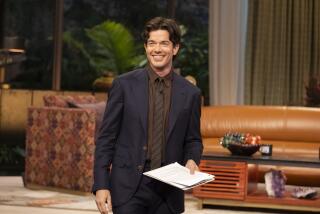For KPCC-FM, One Solution Stands Out Above the Others
- Share via
I always say there are two kinds of people in this world: those who love public radio and those who don’t even know it exists. During the O.J. Simpson trial, I found myself riding up in the elevator with Johnnie Cochran, who asked me who I worked for. “Public radio,” I replied. “Public radio?” he asked, puzzled. “I thought all radio was public.”
I’ve been very fortunate the past two years to host the Friday edition of “Talk of the City” on KPCC-FM (89.3). After more than a dozen years covering local politics, high-profile trials and the International Criminal Tribunals for the former Yugoslavia and Rwanda for public radio, I was invited by KPCC program director Larry Mantle to put my expertise to work in a different format. Instead of interviewing newsmakers on the run, now I get to do it in-studio--but with tens of thousands of people listening and calling with questions of their own. We talk about elections in India and Nigeria, as well as those in Pasadena. We talk about reforming the L.A. City Charter as well as the United Nations Charter. Everyone from Salman Rushdie to Madeleine L’Engle to Jackie Robinson’s widow, Rachel (who autographed my Brooklyn Dodgers jacket), has dropped by to talk about books. We’ve broadcast live from London, Washington, the Hague, even Kigali, Rwanda. We provide an intelligent talk radio alternative for the smartest, savviest listeners in Southern California.
But five hours of local programming every day is extremely labor-intensive. And in many ways, KPCC is a tiny, old-fashioned station in a new era of public broadcasting. “Talk of the City” and “Airtalk” are produced by just three full-time and one part-time staff. They labor on computers so old you have to pedal them to keep them going. KPCC lacks a full-scale development department, a public relations person, even a full-time general manager. Sorry, no money.
*
Enter Minnesota Public Radio. Most people know MPR as the place where Garrison Keillor got his start. When NPR declined an invitation to distribute “Prairie Home Companion” nationally, MPR was born.
Minnesota is an interesting place. Not only is there enormous public (read: government) support for the arts, there’s a statewide public radio network that reports daily on activities in the capital and elsewhere around the state. Imagine. Local and statewide news that doesn’t stain your fingers and lasts longer than 35 seconds.
MPR has offered to build a 10-person news department at KPCC under the direction of Bill Buzenberg, the man who invented NPR News. Students at KPCC would have the opportunity to learn digital audio technology on state-of-the-art equipment. MPR would strengthen our intelligent talk programming. And MPR is looking for new “creative content.” It wants to find the next Garrison Keillor and the next Ira Glass. Where better to look than the city where every waiter has a screenplay-in-progress on his laptop?
MPR’s infusion of capital would mean an opportunity to do more than just read local news headlines at the bottom of the hour. It would mean competing with the L.A. Times for stories. It would mean a newscast without car chases. It would mean in-depth public radio local news reporting to complement our intelligent talk radio format.
Last month at KPCC, we once again were hawking T-shirts and Hollywood Bowl tickets and autographed books by famous and not-so-famous authors--to motivate our listeners to get out their checkbooks and become subscribers. But we have no idea whether this fund drive will be our last. We have no idea whether KPCC’s intelligent talk radio format will disappear forever.
You see, KPCC’s license is held by the trustees of Pasadena City College, who have been doing some thinking of their own about the little radio station on campus. Several options besides the Minnesota Public Radio partnership have been suggested, including some sort of joint venture with public television station KCET. The most serious alternative seems to come from C-SPAN, which proposes to lease out KPCC’s air time for gavel-to-gavel coverage of U.S. House and Senate hearings. Don’t laugh. It’s already happened in Washington, D.C., which lost its only all-jazz radio station when WDCU switched to all-C-SPAN.
I challenge the board of trustees for Pasadena City College to think big. You are the guardians of a precious public resource that reaches far beyond your voting constituencies in Pasadena. You hold the license for a public radio station that reaches listeners from Idlewild to Rancho Santa Margarita to Ventura. This is your opportunity to create a public radio news source and intelligent talk radio provider for the 21st century. This is your opportunity to create a legacy for all of Southern California. Become a partner with Minnesota Public Radio. Because the truth is, all radio is not public radio.
More to Read
Sign up for Essential California
The most important California stories and recommendations in your inbox every morning.
You may occasionally receive promotional content from the Los Angeles Times.










